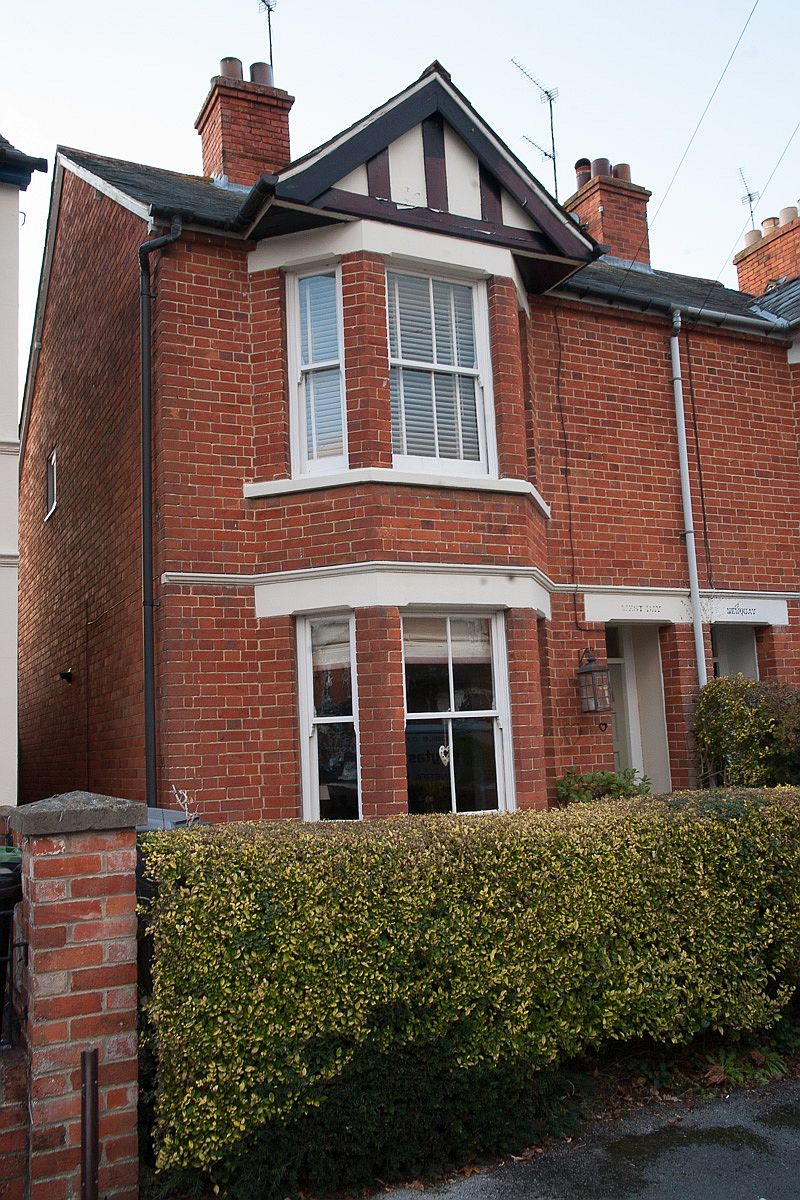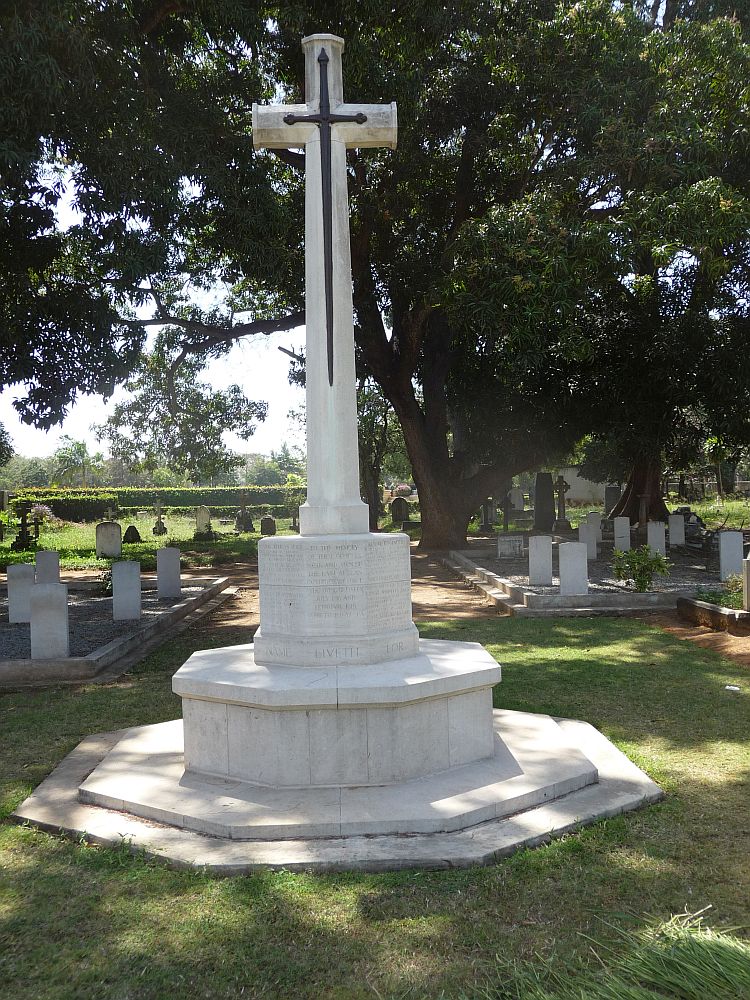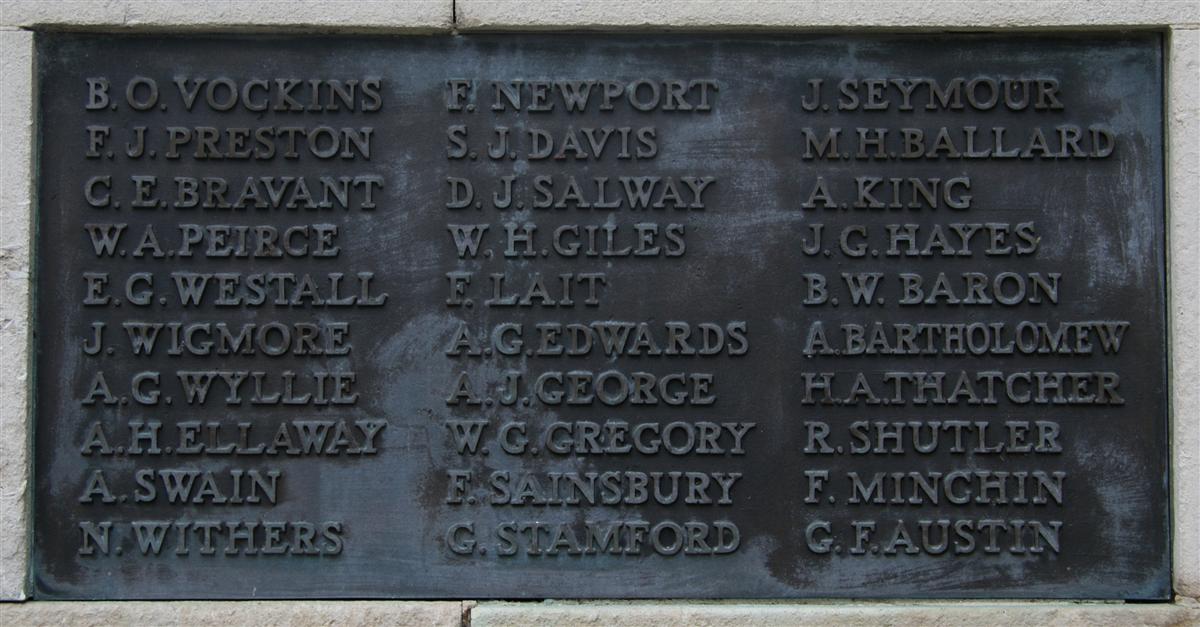Frederick Sainsbury
Captain Frederick Sainsbury, East Africa Labour Corps

11 Salcombe Road formerly 'West Bay' - the name is still inscribed in the lintel above the entrance. |
Charles and Emma, who married in London in 1870, had a total of children: Charles George (1871), Alice Grobety (born 1873), Henry (1876), Frederick (1877), Leonard (1879), and Mary Elizabeth (1883). Sadly three died in childhood : Charles (1880), Alice (1873) and Mary (1884). Emma died in 1889; Charles remarried in 1891.
Fred was schooled at a dame school before being admitted into St Nicolas’ National School on 3 May 1886 – although the school admissions register is a little confusing. The register shows a birthdate (22 November) in 1879 and his father’s name as Henry – neither of which match Fred, but it also gives his father’s occupation (grocer) and address (Enborne Road) correctly; and he left the school to transfer to the Wesleyan School on the same day has his younger brother Leonard.
Following his schooling Fred became an errand boy, a common occupation for young teenagers who left school as 12 or 13-year-olds. He then became an apprentice to Samuel Elliot, founder of one of Newbury’s major companies. Elliott’s greatest successes came after Samuel’s bankruptcy and loss of control, but it was a well-respected woodworking firm in his day. Fred worked as a wood turner and spent some of his spare time as a volunteer in the local militia (1st Volunteer Battalion, Royal Berkshire Regiment).
On 1 February 1900 he went a step further in his military involvement and enlisted into the regiment proper in response to a call for recruits during the Boer War. Many volunteers thought they would be taking the place of regular troops on garrison who would thus be freed to go to South Africa. However, it was not long before they were on ships bound for the action.
This was a life changing move for Fred, he would never return to Newbury and his old life. He served in South Africa with the Berkshire Yeomanry Company and came home to Newbury with them to a hero’s reception. He soon returned to South Africa and made a life in the so-called ‘Dark Continent’. By the time war broke out he had started a rubber plantation in German East Africa – not an ideal position for an Englishman to be in! His adventures in Africa are well detailed in his obituary below.

The Mombassa Memorial bearing the names of men of the East African Campaign whose bodies were buried at sea. |
Newbury Weekly News, 13 March 1919 – Deaths
SAINSBURY. – Capt F Sainsbury, the beloved son of C G Sainsbury, Salcombe Road, died on board the s.s. Kenilworth Castle, from influenza, on his way to take up his duties at Dar-es-Salaam, East Africa.
The following week the newspaper published an obituary detailing a life of adventure, the stuff of storybooks:
Newbury Weekly News, 20 March 1919 – The Late Capt Sainsbury
A Newburian’s Adventures
Many members of the old “E” Company of Newbury Volunteers will recollect the late Captain Frederick Sainsbury, son of Mr G Sainsbury, of Salcombe Road, whose death was recorded in our last issue, one of the first of the Newbury men to volunteer for active service in 1899 for the Boer War. He served through that campaign with the Berks Yeomanry Company, and participated in the presentation and public reception accorded the Newbury men on their return. He returned to South Africa, and after a varied experience, including service in the Cape Mounted Police and gold mining in Johannesburg, he made his way to British East Africa. A keen shot and fond of adventure, he made several excursions into the heart of the “Dark Continent” with big game-hunting parties. Eventually, he settled in German East Africa, and obtained employment on the construction on the Central railway, which the Germans were making right away to the great lakes of Victoria, Nyasa and Tanganyika.
Some two years before the war he took a lease of land and laid out a rubber plantation, but war being declared he was placed under arrest and taken to the seaport of Dar-es-Salaam. A few days later a British Naval party visited the port and he was fortunate enough to escape by their assistance, only to witness from Zanzibar a few days the destruction of the “Pegasus,” the friendly vessel by which he had made his escape.
He offered his services to the East Africa Field Force and, being entrusted with the work of enlisting native troops and the conduct of transport, he quickly won promotion.
In November 1917, in an encounter with a wild bull buffalo, he was badly gored, and this necessitated many months of hospital treatment, and a long sick leave, the last four months of which he spent in England. He left Liverpool on February 14th on the s.s. “Kenilworth Castle,” apparently in the best of health and spirits, for return to duty, but contracted influenza on the voyage and succumbed before reaching Cape Town.
Courageous, unselfish, retiring in disposition, but bold in the execution of any arduous duty, Captain Sainsbury was a true type of the men who have made the name of Englishmen respected in every clime.
 Frederick's name on Newbury War Memorial. (upper middle) |
Much sympathy has been expressed to Mr and Mrs Sainsbury in the loss of a loving and devoted son.
Locally he is remembered on Tablet 4 of the Newbury Town War Memorial and on the memorial to lost members of the Wesleyan Methodist Church in Northbrook Street, Newbury.

Find a memorial :
| Died this day: | |
| 02 March 1919 | |
| Ernest H H Youngs | |
| Theale |

Like this site? Show your appreciation through a donation to a great charity.